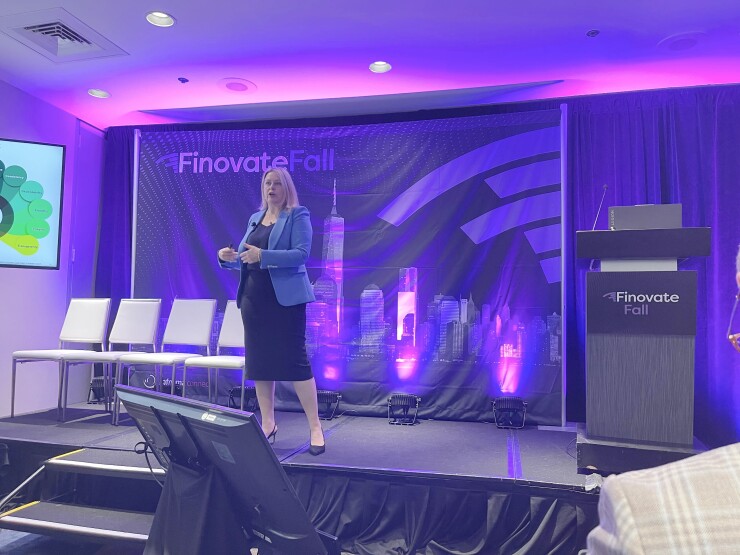
First, though, they need to figure out exactly what "customer trust" means.
"The thing is that most financial services firms don't really know how to measure trust. They don't know what drives customer trust," said Alyson Clarke, principal analyst at Forrester, in a keynote talk during the FinovateFall conference in New York this week.
"It really does have a massive impact in terms of your ability to attract, retain and serve customers and keep them loyal in your organization. And it has an impact above and beyond customer experience," she said.
More than one-third of U.S. consumers have weak or very weak trust in financial brands, according to the market research firm. Looking at large banks in 2023 worldwide, only two institutions, including Navy Federal Credit Union in the U.S., fell into the "strong trust" bucket.
Most banks were found in the moderate range, but at the bottom, the largest brands garnered the weakest trust in their customers' eyes.
"That matters because of revenue," Clarke said.
"What we know is that when you have strong customer experience, earning more trust will continue to drive you more revenue. There is a multiplicative effect."
Every interaction with a customer is an opportunity to earn or destroy trust, she said. Adding to the number of interactions over time, businesses can create something akin to a brand equity fund to draw from when an error occurs. Seventy-three percent of consumers Forrester surveyed said they would forgive a company they had high trust in for a service- or product-related mistake.
While Forrester's data looked specifically at banks and credit unions who offer several lines of business, nonbank mortgage lenders and fintechs also stand to see benefits with a customer-trust strategy, as they look for new revenue. The largest nonbanks over the past two years have moved into new products
While earned trust can pay off in referrals and repeat clients, it also means customers are more likely to share personal data, a valuable asset if consumers grow hesitant
"We talk about personalization. We talk about open banking. All of that requires your customers to want to share information and data with you," Clarke said.
Getting to a high customer-trust point, though, requires more accountability, empathy and dependability, three areas which banks rank low on, Forrester has found.
That data "tells us most banks are focusing their energy in the wrong area, like they think it's about keeping money safe. Well, it is, but that's not going to earn you more trust and more revenue," Clarke said.
While risk in AI may make some consumers cautious,
"Before, we were very product-centric," said Mirella Reznic, chief strategy officer at Valley Strong Credit Union, referring to the banking industry during a separate panel at the Finovate event.
Fintechs "really transformed and forced banks and credit unions to think differently," she said.
"We have a really large client base and data that can be unlocked that does allow us an opportunity to truly personalize and both attract and retain clients as well. But we must do that in a personalized manner," added Sherry Graziano, head of digital, client experience and marketing at Truist Financial, in the same discussion.
"This is where data is your friend, and capturing that data from the complex transaction or conversation is your friend," Graziano added.




